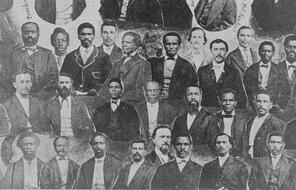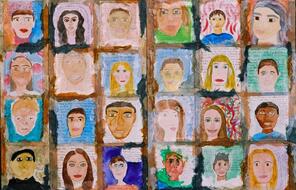
Social Studies
Teach Social Studies with Facing History
Honed over the course of nearly 50 years, our approach to social studies invites students into deeper engagement with the world around them, preparing them to be active and informed citizens committed to making a difference.
What We Offer
- Academically rigorous and emotionally engaging social studies resources, including lesson plans, C3-style inquiries, units, primary sources, and teaching strategies for history, civics, government, and humanities courses.
- Research-backed instructional materials designed to align with the National Council for Social Studies (NCSS) standards, the C3 framework for inquiry-based learning in social studies, and social studies Common Core standards.
- Top-rated professional development opportunities for social studies educators.
- Opportunities to improve academic outcomes and student engagement in social studies across your whole school or district.
Explore our full library of social studies resources.
Our Pedagogy
Our social studies curriculum guides students as they explore human behavior, asking them to consider connections between their own actions and the actions of others. By examining the complexities of being human, we nurture caring and curious adolescents who grow into brave and engaged adults. This proven approach is based on more than 50 years of data about student learning and engagement.

US History Curriculum Collection: Democracy and Freedom
Draw from this flexible curriculum collection as you plan any middle or high school US history course. Featuring units, C3-style inquiries, and case studies, this curriculum collection helps you explore themes of democracy and freedom with your students throughout your US history course.
Social Studies Learning Objectives & Student Outcomes
- Explore the complexity of identity, membership, and belonging
By exploring how our sense of identity, belonging, and membership is shaped by the time and place in which we live, students will gain the ability to analyze how their own identities influence their choices and behaviors, as well as how societies create distinctions between insiders and outsiders. Our approach also helps students consider how social identities such as race, gender, and class impact individual experiences and outcomes. -
Analyze History and its Connection to Today through a Critical and Ethical Lens
Through inquiry-based study students will develop a nuanced understanding of history by exploring multiple perspectives, analyzing the impact of time on ideas and institutions, and recognizing the influence of diverse groups. Our teaching materials are designed to help them examine the agency and choices of individuals, groups, and institutions, understanding their responsibility for historical events and drawing connections to contemporary social issues. -
Develop the Capacity for Informed Civic Participation
By recognizing that history is not inevitable and that the future is contingent on the choices people make today, students will develop a deep understanding of systems of power, historical patterns, and social issues that continue to exist today. They will critically analyze the role of citizens in democracies throughout history, including those who were marginalized and denied political rights. Through this exploration, students will recognize the significance of their own decisions, how they impact others, and their ability to shape their communities and the world.
Implement the Facing History approach at the school or district level to see the full impact of Facing History in action.
Explore
School & District ProgramsAligned Social Studies Professional Development
Facing History offers a wide variety of professional development experiences that support making the most of our social studies curriculum. These offerings also develop educator competencies that are foundational to our approach, including: nurturing student-centered classrooms; promoting inquiry-based learning and deliberative skills; and fostering empathy and ethical reflection.









